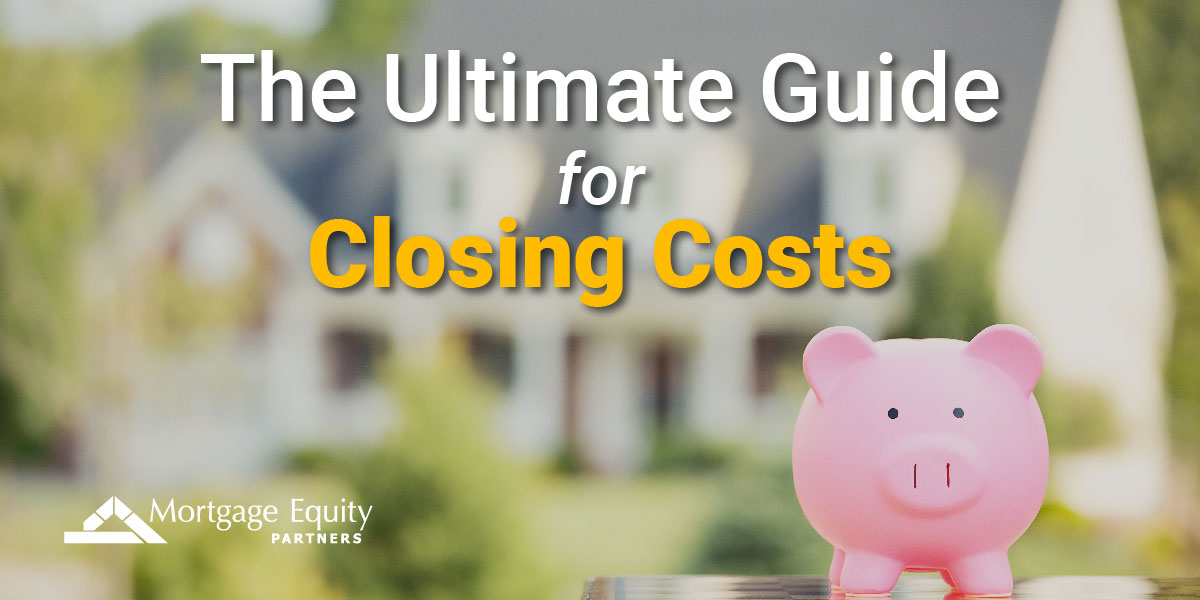
A complete guide to closing costs for mortgages
Buying a home is an exciting milestone, but it comes with significant financial responsibilities. One of the key expenses you’ll encounter is closing costs. Understanding these expenses is crucial for all borrowers, especially first-time homebuyers. These additional charges associated with purchasing a home can be intimidating, but this guide will explain what you need to know about closing costs for a home loan.
What are closing costs?
Closing costs are fees paid at the end of the home loan process. They cover various services required to finalize the mortgage. Mortgage Equity Partners will provide an estimate of all the settlement costs, and the title company or other entity conducting the closing will tell you the required amount. Paying these expenses is one of the last things you do before officially taking ownership of a home. The fees include various charges related to property expenses, the mortgage application process, and other paperwork.
Here is a breakdown of some of the most common costs involved in a conventional mortgage for a single-family home:
Application fee/loan origination fee
Some lenders charge this fee to process the loan application. The application fee may be a separate fee or a deposit applied to other closing costs.
Appraisal fee
A home appraisal will be ordered to determine how much your property is worth. The fee pays for the services of licensed professional appraisal to determine the property’s value.
Attorney fees (if applicable)
Covers the cost of legal services.
Credit report
A charge to pull credit reports.
Deed recording
Cost depends on the type and complexity of the transaction.
Discount points (if applicable)
Fees paid to the lender at closing in exchange for a lower mortgage interest rate.
Escrows-homeowners insurance
Typically required to protect the home from loss or damage. If the escrow is being paid as part of the mortgage, you may be required to pay the first year in advance on or before closing day.
Escrows-property tax
Depending on your location, you may be required to pre-pay a certain number of days’ worth of property taxes at closing if they are being paid as part of the mortgage.
Flood certification
You will likely need to pay $15 – $25 for a flood certification. This money goes to the Federal Emergency Management Agency (FEMA), which uses the data to plan for emergencies and target high-risk zones. This closing cost only applies if you’re buying a house in a flood zone.
Home inspection
For a licensed home inspector to ensure there are no issues with your prospective home.
Notary fees
For a licensed notary public to confirm that the people named in the documents signed them.
Prorations for your share of costs
Includes utility bills and property taxes.
Private mortgage insurance premium
This premium is intended to protect the lender in case you default on your loan if you put down less than 20% of the home’s sales price as a down payment.
Recording fees
Charged by local government to officially record the property transaction.
Survey fees
Can uncover errors in a property’s legal description.
Title insurance
Protects against issues with the title that may arise.
Transfer taxes
Taxes imposed by the state or local government when the property title is transferred.
Additional closing costs may be associated with different loan and property types and the state in which the property is located.
How much should I expect to pay for closing costs?
The amount you will pay for closing costs varies greatly depending on your location and home price. In most cases, you should expect to pay between 2% and 6% of the purchase price of your home in closing fees. So, if your home costs $200,000, you could pay anywhere from $4,000 to $12,000. Closing costs include one-time fees and initial installments of recurring expenses. Many of these fees are variable and may differ based on the location, size, and price of the property you’re buying.
Who pays closing costs?
The buyer, the seller, a builder, or even the realtors can pay some closing costs. The seller’s closing costs are typically higher, mostly made up by the agent commission although this may change because of the recent NAR Settlement. As the homebuyer, you can ask the seller to cover some of your closing costs as part of the negotiation, especially if the costs are a deal breaker. However, there are limits to the amount sellers can contribute depending on the loan type, so you should discuss this strategy with your loan officer.
When are they due?
Closing costs are typically due at closing, but some closing cost assistance programs allow borrowers to defer or finance these costs. Before the closing costs are due, you should speak with your lender to ensure you completely understand the amount that will be due so there is no confusion at the closing table.
Closing costs are a critical component of the home buying process. They are a significant financial consideration for borrowers, especially first-time homebuyers. Closing costs on a mortgage loan are usually 2%-6% of your loan balance. Ensure you discuss these costs with a knowledgeable loan officer and seek information about down payment assistance and closing cost assistance programs you may qualify for, as they can make a significant difference.
Are you a first-time homebuyer? Download our FREE First-time Homebuyer Guide




